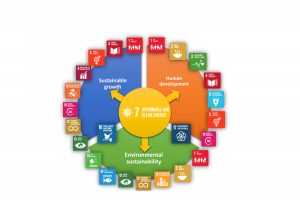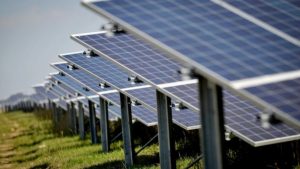A 10W capacity solar household system (SHS) installed in rural Wuna community off Nigeria’s capital city, Abuja, by the government and Azuri Technologies, has become a big deal for hundreds of communal folks who now say they want more than just to switch on their lights bulbs using the SHS.
Power is life in today’s world, and this is because electricity has become too knotted in unison with modern human development. From its offerings, electricity feeds the machines that drives human societies and conveniences; it sets nations on the path of meaningful progress; and guarantees productivity to economies that have it in good measure.
It is based on this that Nigeria’s continued inability to grow her electric power output has correspondingly pulled the quality of life of its citizens below average ideal standings as obtained in other countries of the world.
Records already indicate that the best electricity output Nigeria ever got was a circa 5000 megawatts she momentarily generated in February 2016 for just about 50 per cent of her population presently connected to the national grid.
When she generated the 5000 megawatts, the development was celebrated as a feat – every small success made by the country towards self-sufficiency in electricity always attracts so much fanfare and celebrations though, and this is even more because there are more of her population without electricity.
A village gets picked for a trial off grid solar power system
From a mixed bag of challenges which included consistent pressure on the country’s inadequate national grid, and repeated breakdown of gas supplies to power generating plants in the south, Nigeria’s government was forced to turn to the sun to supply energy to its citizens, but first to off grid communities.
It thus announced in January that power would come to Wuna village, an isolated village in the Federal Capital Territory (FCT) without a connection to the nation’s power grid, through an innovative Solar Homes System (SHS) called the “Quad” which is provided by Azuri, a solar power firm.
The project would then be financed by the Niger Delta Power Holding Company (NDPHC), a special purpose vehicle jointly financed by the three tiers of Nigeria’s government – federal, state and local, to build power systems that could bridge the country’s electricity shortfall.
In partnership with Azuri Technologies, NDPHC launched the SHS in Wuna as a pilot, with the intention of taking it to other off grid communities and lighting 20,000 homes.
What Wuna’s SHS gives out
According to the website of the project executor – Azuri Technologies, the SHS nicknamed ‘Quad’ can power ‘four LED bulbs providing 8 hours of lighting, a radio and a USB port with charging cables for mobile phones’.
The entire system, it explained consists of a 10W solar panel, 4 high brightness LED bulbs, a USB port for charging mobile phones, a digital switch and a patented provision device.
Azuri also offers a “PayGo” reimbursement program for the Quad, thus collecting a monthly fee of N1,900 for every of the system it has installed in the village. The villagers would have to make this monthly payment for about 3 years on a stretch after which individuals will own the solar kits entirely.
According to the firm, the payment covers for the labour of installation, cost of the system as well as an agency fee.
Though OGN contacted Azuri for a more detailed cost analysis of the system which would have provided the villagers and indeed Nigerians a first-hand knowledge of the final cost per kilowatt, no reply was received from it at the time this report was filed.
What the villagers think of the ‘Quad’
Most residents of Wuna village who have the system installed at their homes spoke ecstatically of it to OGN when it did a follow-up visit to their homes.
Thankful to the government and Azuri for bringing the system to them, they stated that for many of their adults, it would be the first time they had electricity that did not come from their noisy fuel generators.
However at 10W, experts told OGN that the Quad system was notably deficient in providing even the most basic amenities to any given household given that it cannot power television sets, fans or other technologies for conveniences.
This also got users of the system in Wuna asking for higher capacity systems instead of what the ‘Quad’ currently offers to them.
A random analysis of the system which OGN ran through solar and renewable energy experts returned varied if not polarized responses, with many applauding and others doubtful of its overall impact.
Much of the discussion on the system stemmed over its cost which balances out to N68, 400 after the 3-year rental period. While proponents argued in favour of the cost, citing the fluctuations in foreign exchange as a major factor since much of the needed components were imported, critics of system noted that the payment plan looked quite exploitative.
These critics pointed out that there are currently many other similar SHS which are readily available at costs significantly lower than the offering of Azuri.
Regardless of the cost debates, these experts however agreed that doubts about the efficacy of solar power systems lighting homes and providing conveniences were beginning to break away, otherwise village folks in Wuna wouldn’t be asking for more from the little success stories they have had from Azuri’s ‘Quad’.





